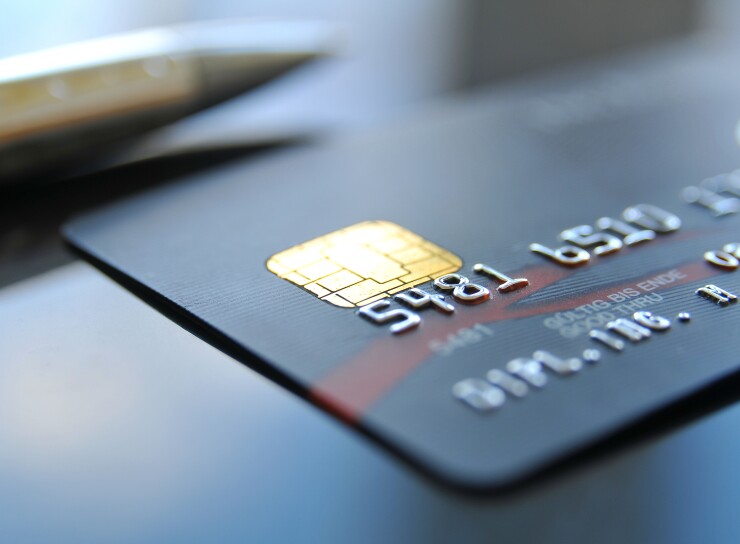Credit card late fees could drop dramatically under a proposal expected to be released soon by the Consumer Financial Protection Bureau. Some analysts are predicting that late fees could be cut in half to as low as $15, while consumer advocates want the CFPB to reduce late fees to as low as $9 or make them proportional to the debt owed by a cardholder.
CFPB Director Rohit Chopra launched a broad assault last year on so-called
"Our expectation is that the CFPB will lower credit card late fees through the rulemaking process to between $15 to $25, though there are some advocates that want fees to go as low as $9," said Ed Groshans, senior policy and research analyst at Compass Point Research & Trading.

Banks and credit card companies argue that a reduction in late fees would harm subprime and low-income consumers the most. Any reduction in late fees would force credit card issuers to increase fees on other products, reduce credit, raise annual percentage rates on all cardholders, and potentially even slash rewards and cash-back cards, bank trade groups argue.
Robert Maddox, a partner at the law firm Bradley Arant Boult Cummings, noted that most large banks cut or
"The fact that banks cut overdraft fees opened up just about every fee that is consumer-related as a possible target," Maddox said.
Currently, banks and credit card issuers can charge $29 for the first late credit card payment and $40 for subsequent late payments within six billing cycles. Some credit card executives have said they are not worried about changes made by the CFPB because nearly all late fees currently are in compliance with the maximum amounts set by the Credit Card Accountability Responsibility and Disclosure Act, known as the CARD Act.
In its upcoming proposal, the CFPB is expected to re-examine whether Regulation Z — the implementing regulation for the CARD Act and the Truth in Lending Act — should continue to have a safe harbor provision that was created by the Federal Reserve Board in 2010. The safe harbor allows credit card companies to raise late fees annually in line with inflation. It also allows for higher late fees for second violations to deter consumers from paying late.
Chopra also has signaled that changes are coming.
"The Fed created a set of immunity provisions that has been going up [due to] inflation every year," Chopra
Credit card companies are coming off three years of abnormally low levels of delinquencies and charge-off rates. Even with a recession looming, credit card delinquencies are expected to rise to 2.6% at the end of this year, up from 2.1% last year, according to
"As we face headwinds with a potential recession, and more and more people have a significant amount of debt on their credit cards, the consumer advocates have been pushing for late fees to go down," Maddox said.
Banks and credit card issuers say that late fees must be set at a level to cover costs, and that a penalty fee is not a hidden cost but rather is necessary to reduce the frequency of a consumer making late payments. Dan Smith, executive vice president and head of regulatory affairs at the Consumer Bankers Association, said efforts to reduce credit card late fees are misguided and would harm the very consumers with subprime credit scores that the bureau is trying to help.
"Late fees are intended to encourage responsible spending behavior and empower consumers to avoid negative impacts on their credit scores that may arise from defaults and delinquencies," Smith said. "Eliminating or dramatically reducing the safe harbor threshold will undoubtedly affect consumers' access to these valued products as credit card issuers would be forced to drastically alter their business models to mitigate the risks associated with increasing instances of missed payments."
The CFPB is considering changes to the CARD Act including the safe harbor for penalty fees. Currently, credit card companies cannot impose a late payment penalty unless they have determined that the dollar amount of the fee represents "a reasonable proportion of the total costs," incurred by the financial institution, the
Groshans at Compass Point said he thinks the bureau may decide to change the language of the safe harbor to favor consumers rather than financial institutions.
"The entire industry has been operating under that safe harbor for over a decade, so don't think the safe harbor is going away," Groshans said. "But the risk is that the CFPB tries to change the basis of the safe harbor.
"Right now the basis [of the safe harbor] is if the fee is reasonable … relative to the cost incurred by the financial institution," he said. "Do they try to change that to whether the fee is reasonable and proportional to the harm to the consumer? That's a very different safe harbor and it seems like that could be feasible."
Consumer advocates say credit card late fees disproportionately impact subprime borrowers and serve as a back-end profit center for banks and credit card companies. Advocates want late fees tailored to the amount of the debt owed by a cardholder and suggest that the CFPB include a mandatory waiting period of several days before a late fee can be assessed.
"The late fees imposed by card issuers exceed the amounts they incur in costs, especially for accounts with smaller balances and for delinquencies of short periods of time," said Chi Chi Wu, a staff attorney at the National Consumer Law Center.





